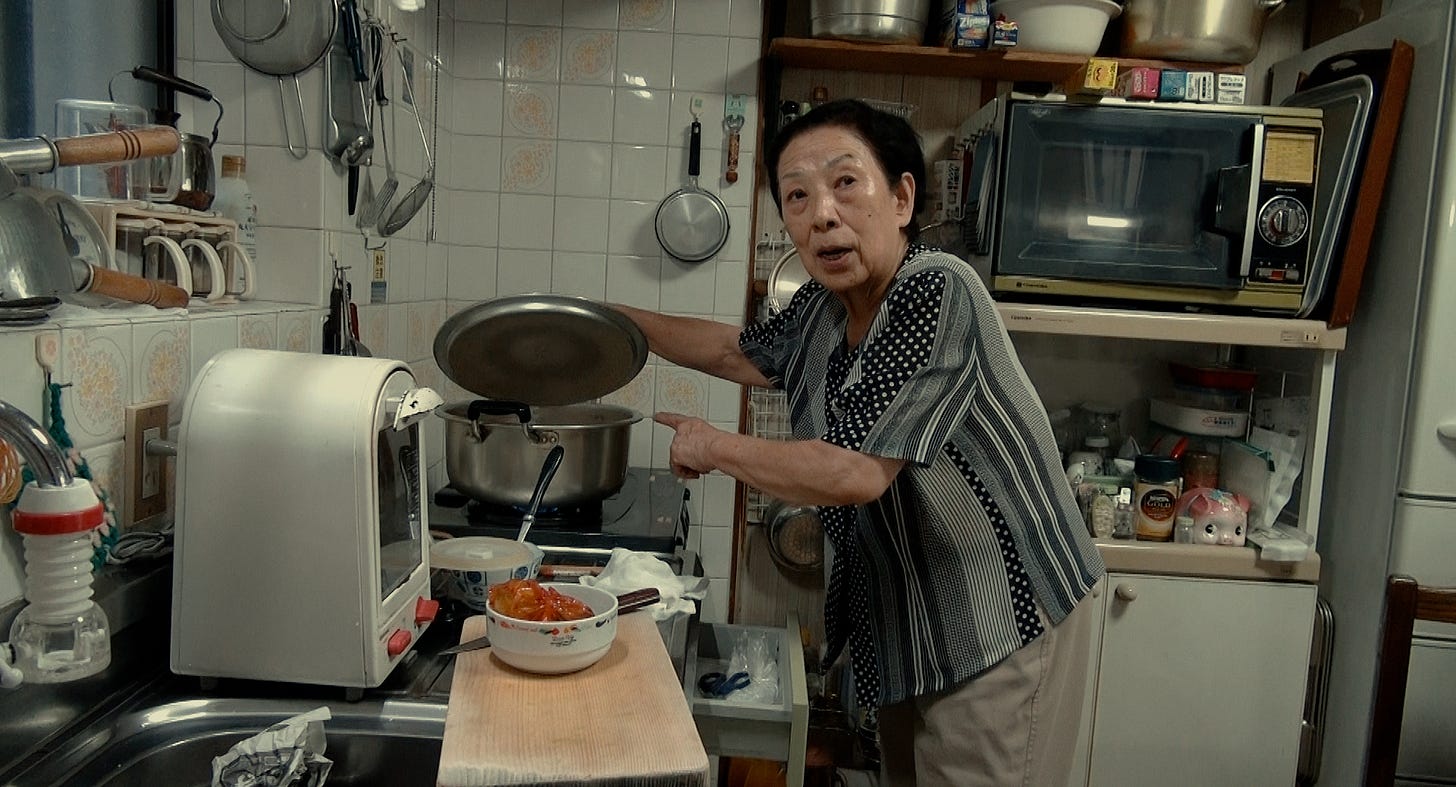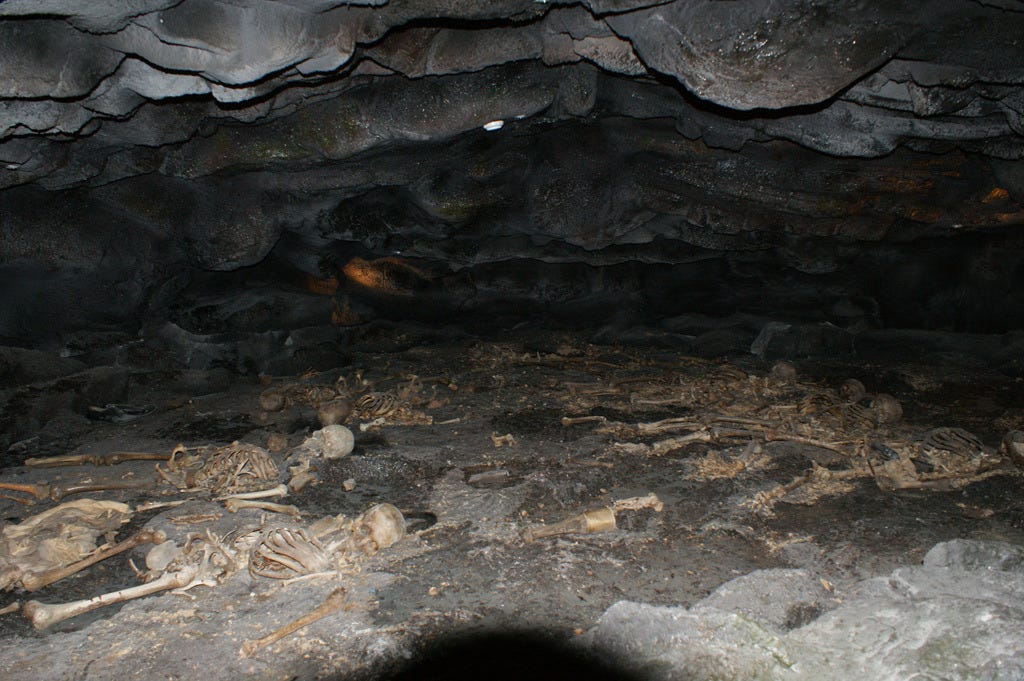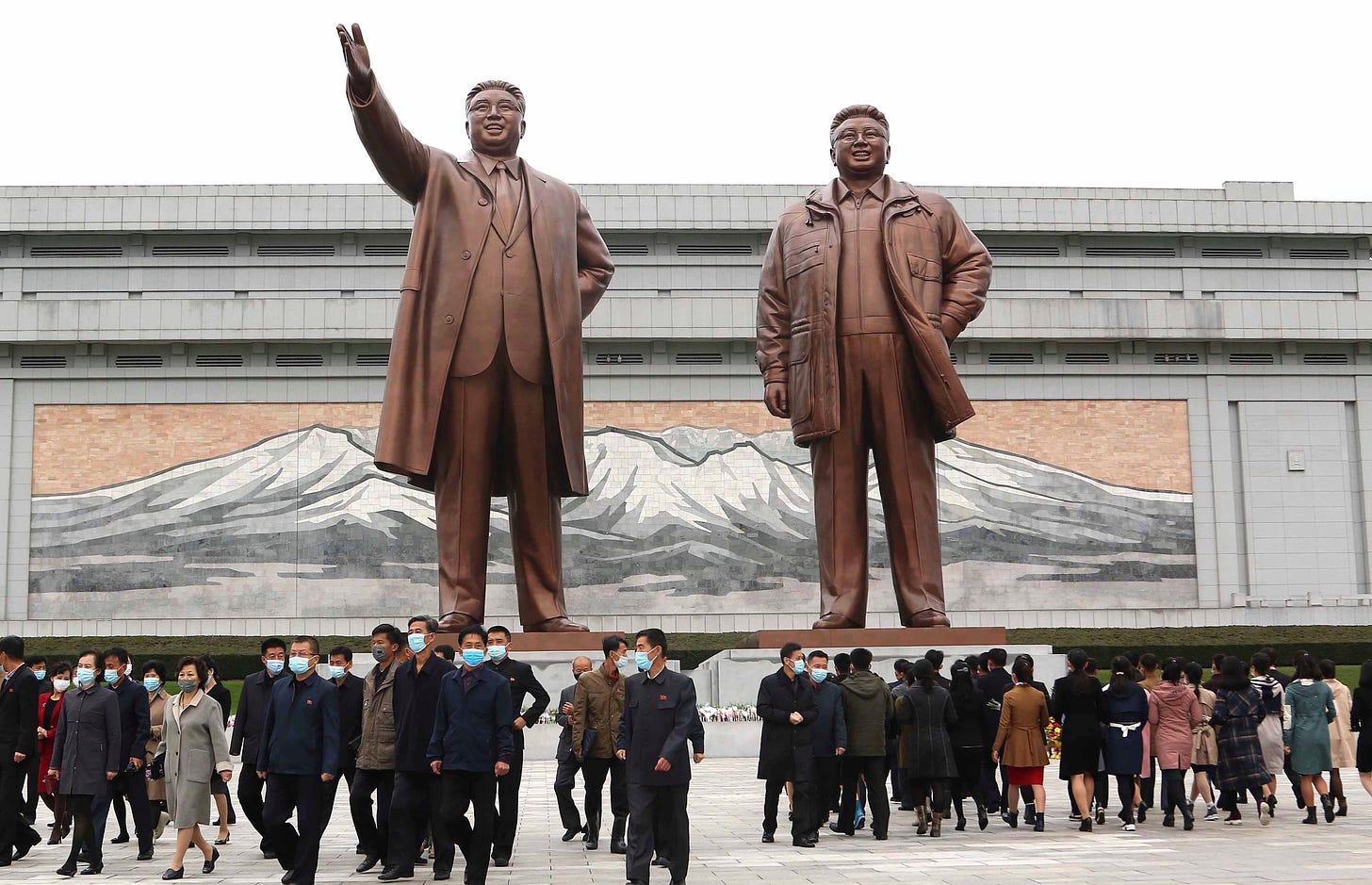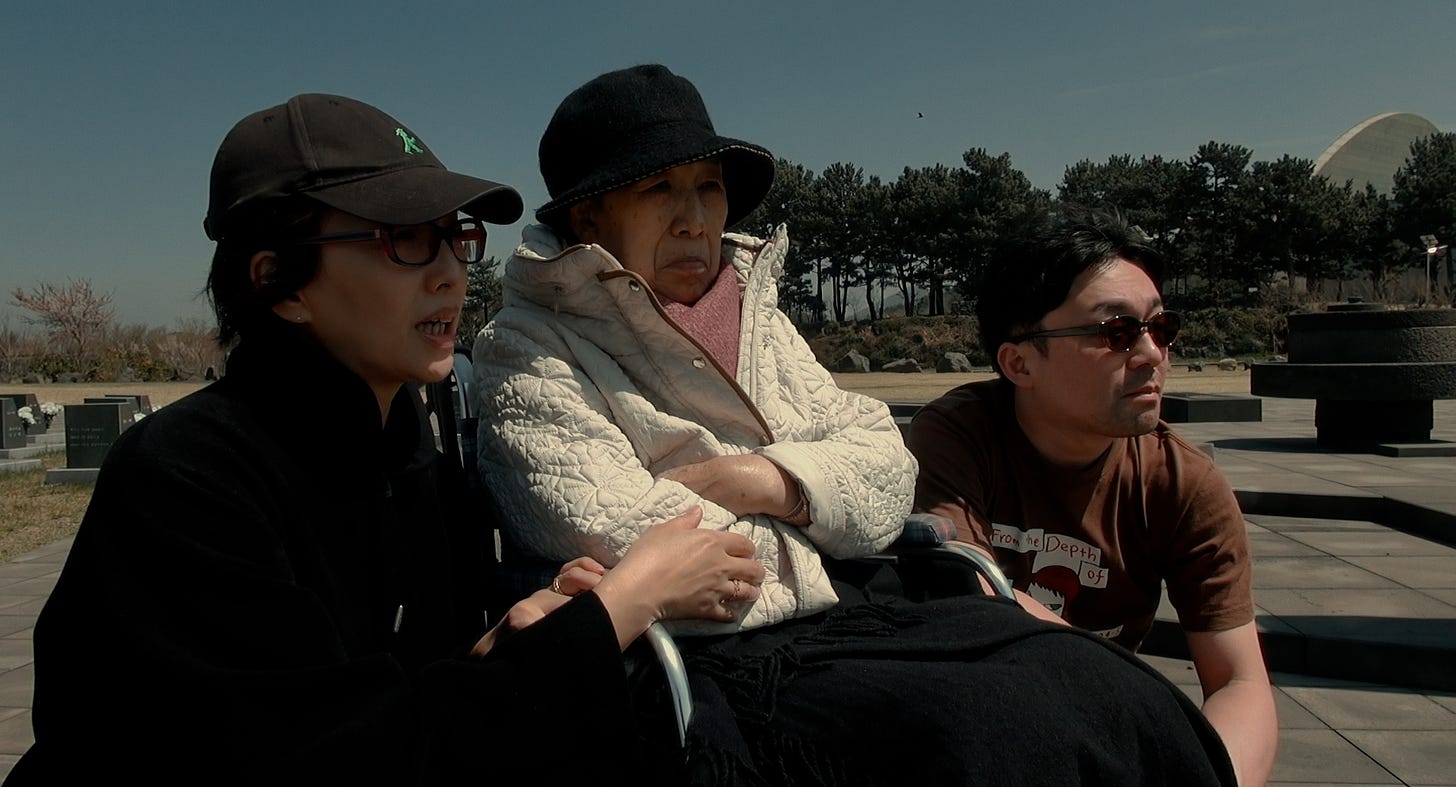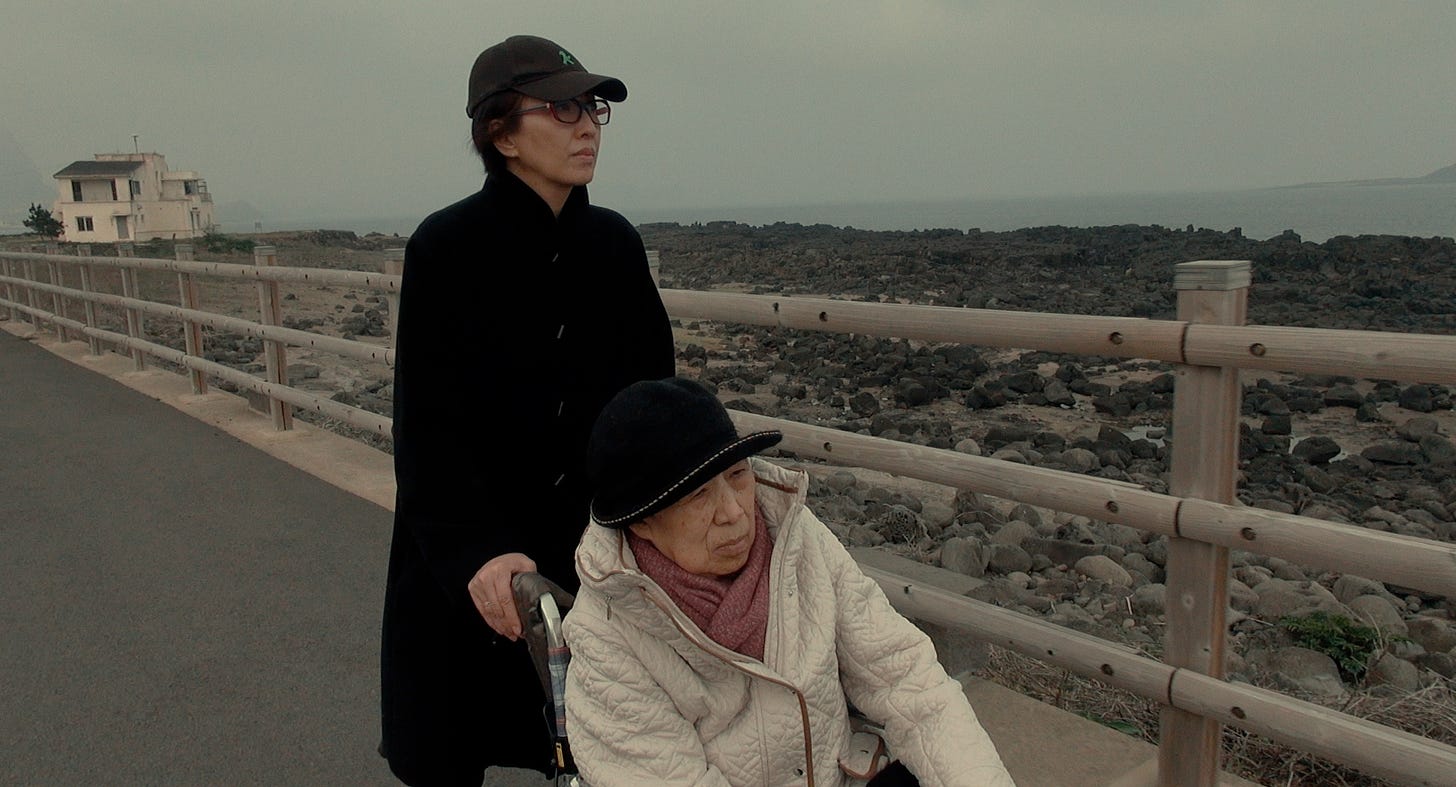Original link: https://sehseh.substack.com/p/9a6
Mother Kang Jing Hee, director Liang Ying Hee and her Japanese husband, three people of different nationalities, shared a pot of chicken soup at the dining table. The special dishes represent the nostalgia of the diaspora, and are also a common language that connects different ideologies. (Photo credit: Taiwan International Women’s Film Festival)
Text / Cai Yuanyan
The latest documentary “Chicken Soup and Ideology” by film director Yang Young-hee, the second generation of Koreans in Japan, is the third part of her personal family story. At first glance, the title looks like a story based on food, but it is actually about the unknown past of the director’s mother.
Yang Young-hee learned in 2011 that her mother was a survivor of the April 3rd incident on Jeju Island , which made her re-understand the historical pain of her parents’ generation. In the movie, she takes her mother back to the seaside where she escaped the massacre purgatory, looking for the names of relatives and friends she met on the monument. Before Alzheimer’s wipes out my mother’s sense of time, keep her memory alive.
The World Walk has important stories you haven’t read yet. We focus on global issues from a gender perspective, complementing stories of dilemma, breakthrough, connection, and change that traditional power perspectives ignore.
Please pay a subscription to become our partner and walk with women around the world.
Creations born out of intergenerational trauma
At the beginning of the documentary, it was introduced that the 57-year-old Liang Yingji has a father, mother, and three brothers at home. She was the youngest child, but grew up like an only child because her brothers were sent to North Korea when she was a child. The camera was taken to the second floor of the hometown in Osaka, where portraits of former North Korean leaders Kim Il-sung and Kim Jong-il were hung on the walls, as well as photos taken before his brother “returned to the motherland”, illustrating the family’s unique ideology.
If you have seen Yang Young-hee’s first two works, “Dear Pyongyang” (2005) and “Another Me: Shanhua” (2009), you will be able to better understand the complex historical facts and family tragedies covered in this film. The former recorded that after Yang Young-hee’s father sent her brothers to Pyongyang, he realized that North Korea under Kim Il-sung’s rule was not a paradise as propaganda, and the father spent the rest of his life trying to raise supplies to send to the missing children; the latter filmed that Yang Young-hee grew up in Changes before and after receiving patriotic education in North Korea’s concubine Shanhua.
Yang Young-hee’s father, Yang Gongsun, was born in Jeju Island; her mother, Kang Jung-hee, was a North Korean born in Japan in 1930. The two married in Osaka in 1952 and worked together on the initiative of the General Federation of Koreans in Japan (actually a North Korean diplomatic agency). , also requires children to receive patriotic education in North Korea and obey the leadership of the Kim regime.
In the movie, Yang Young-hee said that she couldn’t figure out why her parents supported North Korea since she could remember.
The reason for the misfortune was not revealed until Liang Ying Hee’s mother was lying on a sick bed in her later years: she experienced the “April 3 Incident” on Jeju Island in 1948. So Liang Yingji picked up the camera again to shoot family history for the third time. This time, the focus was on her mother Kang Jingji, tracing the root of the change of family fate. The documentary began filming in 2015 until the mother suffered a stroke in 2019.
In order to make the audience better understand the real life, which is more tangled than the novel, Liang Yingji tried many different types of shots, such as animation, interviews, daily family scenes, etc., and finally completed a very attractive story-about a small individual who was trampled by the times , a family divided in two by North-South division and ideology, but also about the love and reconciliation between family members that transcend pain.
Through the editing of the documentary, we can also see Liang Yingji’s change in her parents’ mood, and the humorous and warm relationship with her family. When she took her mother to take a photo of the hanbok salon, she said with a smile that her father especially liked the way her mother wore traditional clothes, “Mom is so beautiful, it’s time for Dad to get up from the grave.”
She released a conversation with her father in the film, which also made the image of this North Korean supporter more three-dimensional and full: he dealt with the funeral a long time ago, ordered a house plate with his wife’s name engraved on it, and transferred the house to her name down, because of love. He was worried that his sons would be discriminated against in Japan, so he decided to send them back to the motherland, also because of love.
A massacre that changed the lives of the islanders
During the Pacific War, the U.S. Air Force raided the Japanese Empire, and many Koreans in Japan fled to the nearest Korean island, Jeju Island, and Kang Jinghee was among the refugees. After the war, the Allies, the Soviet Union and the United States, took the 38th parallel as the boundary and accepted the territory of the Korean Peninsula respectively. At that time, life on Jeju Island was miserable, officials were corrupt, and mass demonstrations were suppressed, opened fire and killed by the Japanese police under the US Military and Political Office stationed in North Korea, causing hatred between the police and the people.
In 1948, North and South Korea officially split into two regimes. Before the U.S. handed over power to South Korea, the first presidential election was scheduled for May 10, and patriotic people feared that the election, which excluded North Korea, would thwart reunification. Coupled with the fact that islanders were continuously tortured to death, the resentful residents of Jeju Island and members of the South Korean Workers’ Party launched a large-scale anti-police and patriotic uprising on April 3 and raided police agencies based on Hallasan Mountain.
For the next seven months, both the US military and the subsequently established government of the Republic of Korea believed that the riots were mainly caused by members of the Workers’ Party inciting rebellion. In November 1948, the Syngman Rhee government declared martial law on Jeju Island. The Legion once ordered a “scorched earth policy” on the mountainous area, killing living people, setting fire to villages, and laying corpses everywhere. According to the investigation by the truth commission after 2000, the “43 Incident” massacred at least 30,000 people, equivalent to about 10% of the island’s population.
The scene of the Daelan-dong massacre is recreated at Sisan Peace Park in Jeju Island. (Wikipedia/public domain)
“I was so scared at the time. There were gunshots everywhere, and many women in Jeju Island died at the scene. Many people were taken to the school, lined up in a row, and shot with machine guns… Not only the students, but also the villagers followed suit. The ‘red bandits’ were all dragged there.” In the documentary, Kang Jingji was not willing to tell the long-buried secrets until her later years, how the 18-year-old protected her younger brother and sister all the way through the bloody path , fled to the seaside smuggling.
The Separation and Sorrow of the Koreans in Japan
The “Jeju Island April 3 Incident” cast a shadow on the hearts of many who witnessed it. Some of the survivors fled to the Kansai area of Japan, which also explains why some North Koreans in Osaka hate the United States and South Korea. But Japan is not a country where the Koreans can settle down with peace of mind: Ikuno District, Osaka, where Yang Yinghui’s hometown is located, is one of the main Korean communities in Japan. Because some Koreans at the bottom are engaged in the underworld and gambling industry, the Japanese discriminated against North Korea very much in the last century. people.
After the recovery of the Korean peninsula, North Koreans in Japan faced a chaotic identity and had to choose one of three nationalities: to submit to Japan or South Korea, or to retain “Korean nationality”. The Japanese government does not recognize North Korea as a country, so “Korean nationality” is equivalent to “stateless” with permanent residency, and entry and exit are particularly troublesome. However, Yang Ying Hee’s family insisted on keeping her “North Korean nationality”. Her father, Yang Gongshan, was a patriot who yearned for reunification.
Both Koreas were under authoritarian rule at the time, and in the early days of the founding of the People’s Republic of China, North Korea developed rapidly with the help of the Soviet Union, which made many Koreans in Japan yearn for their motherland. From 1959 to 1984, the General Federation of Koreans in Japan launched the “Return of Koreans in Japan Movement”, calling on about 90,000 Koreans living in Japan to live in North Korea, the “Paradise on Earth”.
When Yang Young-hee was 6 years old, her three brothers were sent to Pyongyang one by one, only to discover that North Korea lived a life of scarcity and surveillance. This was a pain she could not let go of for a long time. Liang Jianwu, the eldest brother who loves classical music, told her before leaving: “Yingji, listen to your favorite music and enjoy your favorite movies.” In “Chicken Soup and Ideology”, Liang Yingji explained her brother’s ending. Kenwu, who had no access to music in North Korea, unfortunately suffered from bipolar disorder and died in 2009.
In the same year, Liang Gongshan also passed away and was buried with Jianwu in the “Patriot Cemetery of Overseas Compatriots” in Pyongyang. Liang Yingji asked her mother where she wanted to be buried. The mother said she wanted to sleep with her husband. It was difficult for Yang Young-hee to fulfill her mother’s wish, because after the release of “Dear Pyongyang”, North Korea banned her from entering the country, and she subsequently naturalized South Korean nationality for the convenience of international business trips.
Chicken Soup and Ideology
Liang Ying Hee is the only child in the family who is lucky to “be yourself”. After returning home from her studies at New School University (NSU) in New York, she moved to Tokyo to pursue a film career with a single-minded desire to integrate into mainstream Japanese society. Before learning that her mother had experienced the “April 3 Incident”, her whole life, including the films she made, had to deal with the pain brought by the nation’s history. As a Korean, she felt alienated from Japan, and her family had been broken since she was a child. Anger, and the family’s political stance that they cannot understand and resist.
After her father died, she regularly returned to Osaka to visit her mother, who lived alone. Seeing that her mother was always thinking about sending supplies to North Korea, and there was not much left in her retirement savings, she was both angry and helpless, and at the same time she felt that such a mother who refused to listen to her repeated persuasion was a burden.
It was not until Liang Yingji brought her Japanese husband, Kaoru Arai, to visit at home, and the movie scene suddenly became cheerful. Kang Jingji happily worked in the kitchen early in the morning, serving her son-in-law with delicious and orthodox Korean ginseng chicken soup. She skillfully stuffed red dates, garlic, and ginseng into the chicken belly, sewed the chicken belly with needles and threads to prevent the ingredients from overflowing, and then simmered for 4 hours on low heat until the soup was rich and milky white.
“Chicken Soup and Ideology” director Liang Ying-hee (left), Liang’s mother Kang Jing-hee (middle), and Liang’s Japanese husband Kaoru Arai (right) at the Sisan Peace Park in Jeju Island. (Photo credit: Taiwan International Women’s Film Festival)
Liang Ying Hee’s parents once insisted that she should not associate with Japanese people. However, in the documentary, this man who is more than ten years younger than Liang Yingji and whose nationality is Japanese, hit it off with the North Korean mother-in-law. The three people of different nationalities chatted and laughed at the table and shared a pot of chicken soup. Before returning to Tokyo, Arai told Liang Yingji that he felt very sad to see his mother surrounded by photos but it was difficult to visit relatives, and then suggested: “Even if the political positions are different, the three of us are in Japan, so let’s eat and take pictures together in the future.”
Liang Yingji found through the camera that Kang Jingji and her Japanese son-in-law always laughed happily when they got along. The two often chatted in the kitchen while making ginseng chicken soup. Kaoru Arai loves this dish very much, and even memorized the recipe and went to the market to buy whole chicken to cook. Perhaps the meaning of the title lies in this: the dishes with characteristic eating habits represent the nostalgia of the diaspora, and at the same time, they are also a common language that connects different ideologies.
reconciliation
From the middle to the end of the documentary, it records the process of Liang Yingji from complaining about her mother to gradually understanding her. Going back to Jeju Island, where the massacres took place, and looking at the monuments filled with people’s names in the “four-three peace zone”, the more she learned about the real history, the more she was overwhelmed by regret and heartache, “I suddenly realized that I am right to my mother, right to my mother. I know very little about this island.” She realized that the pain and regret that it was difficult to see her son was not always in the hearts of her parents.
When you find out that all of your mother’s injuries are due to her injuries, will you still be angry with her?
Liang Young-hee brought her mother to the researchers of the Jeju Island Four-Three Research Association, and finally couldn’t help crying: “I don’t know how she survived what she experienced. In fact, I have always complained about my mother, why I The brothers sent off, but now I can no longer blame her, I feel really sad.” And Kang Jingji listened quietly, holding her daughter’s trembling hand.
“Chicken Soup and Ideology” also depicts the transformation of the director’s mother from being in good spirits to being plagued by illness in her later years. In the second half of the film, Liang Ying Hee handed over the camera to her staff, and the audience can see the infinite patience and care of Liang Ying Hee and her husband for the mother with Alzheimer’s disease. When the mother asked blankly, “Is the son home?”, “Where is the child’s father?”, “Where’s Young-hee?” She responded indifferently: “I probably went to school”, “I should sleep upstairs. “, “Younghee is here!”
In the scene revealing the deterioration of the mother’s condition, the lights on the second floor of the hometown flickered, and the mother slowly stepped up the stairs to see what was going on. But in the dark, she began to look for the figure of her deceased brother, and she was only seen blurred in the camera, as if her consciousness had returned to her childhood. Yang Young-hee found that her mother even gradually forgot the process of the massacre and the fact that her son lived in North Korea, but the North Korean patriotic songs she used to hum are still her favorite melody.
“Did she forget, or is she unwilling to remember?” Liang Yingji said to herself in the film, perhaps for her mother, it is better to forget such painful memories. (Finish)
(“Secrets in the Attic” will be screened at the “Taiwan International Women’s Film Festival”. For more details, please refer to the official website .)
About the Author| Cai Yuyan (Graduated from the Department of Political Science of National Taiwan University, now an international news compiler/reporter.)
Subscribe to the Walk Around Newsletter and we’ll deliver:
[Members only] Go original: a good story that others have not written yet
An Evening News Every Day: A selection of daily news summaries for you
Weekly Newsletter: Good articles from around the world that you may have missed
A Weekly Note: A Weekly Guide to Online Activities
【Exclusive benefits for other members】» See here
This article is reprinted from: https://sehseh.substack.com/p/9a6
This site is for inclusion only, and the copyright belongs to the original author.
